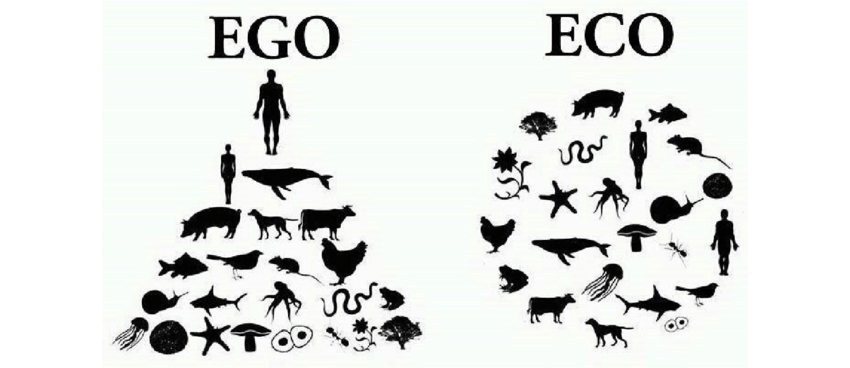The term “anthropocene” describes the current geological era in which human activity is the dominant influence on the natural world. The term is a derivation of the Greek words anthropos, meaning “human,” and cene, meaning “new” and was coined in the early 2000s by biologist Eugene Stormer and chemist Paul Crutzen. Anthropologists argue over various dates for the beginning of the anthropocene, with theories ranging from the formation of sedentary communities around 8,000 years ago to the unprecedented world population growth of the early 1900s.
Despite the dispute over its origin, the anthropocene’s adverse effect on nature is recognized unanimously by the fields of natural and social sciences alike. The accepted belief of human superiority over all forms of life takes root in the highly influential Grecian works of Plato and Aristotle. Why does humankind consider this perception to be the intrinsic way of life?
In his dialogue Timaeus, Athenian philosopher Plato established the conceptualization of human-nature dualism within Western philosophy. He speculated the formation of the universe within an order-disorder binary. Platonic philosophy presents a recurrent motif of two opposing forms, a lower one and a higher one, meant to represent nature and reason respectively. The latter is regarded as separate and superior to the disorder of the natural world. This hierarchical separation contributes “evidence” for his hypothesis that reason was introduced with the inception of humankind, thereby making man superior to the natural world.
Human-nature dualistic philosophy was further developed and instilled in Western civilization with several influential works by Plato’s venerated student, Aristotle. In his famous treatise De Anima, Aristotle forms a hierarchy of the levels of the soul. Three levels are delineated with the lowest level comprising the nutritive level, or the ability to feed and reproduce. The intermediary level, the sensitive level, defines mobility and ability to sense surroundings. The apex of the hierarchy incorporated the intellectual level of the soul that regarded thought, reason, and reflection.
The Grecian polymath held an anthropocentric perspective of the soul and sentience as he believed that humans were the only living organisms capable of the intellectual level of the soul. Similar to Plato, Aristotle believed that the cognitive capacities observed in humans were presumed to be absent in the souls of other beings with animals at the sensitive level and plants at the lowest nutritive level. He is quoted in Politics saying, “we may infer that, after the birth of animals, plants exist for their sake, and that the other animals exist for the sake of man. ”
In contrast, an alternative view to anthropocentrism was proposed by a fellow scholar of Plato’s Academy. Theophrastus, a student of both Plato and Aristotle, presented the idea of ecocentrism that fixates on the intrinsic value and autonomy of all living organisms. In his book Metaphysics, he advocated for the appreciation of the natural world for what it was rather than comparing it to human criteria of intelligence and sentience. However, the works of Theophrastus were significantly less popular than Aristotle during their time and have been poorly preserved over the millennia.
The environmental ramifications of these Western ideologies arise from the humanist belief that human superiority provides moral justification for environmental domination. Political scientist Tim Hayward of the University of Edinburgh argues in his book Anthropocentrism: A Misunderstood Problem that anthropocentrism should be a motivation for environmental protection due to selfish interest since humans rely on the Earth for survival. Despite this reliance, human greed for natural resources has manifested the demise of our world. This ideology in particular is influenced by the French Renaissance philosopher René Descartes.
Cartesian philosophy challenges the theories of Aristotle on the soul with his concepts of res extensa, “extended thing” and res cogitans, “thinking thing.” The latter refers to a higher level cognitive ability that Descartes attributed to mankind alone. Descartes categorized plants, animals, and the Earth within the former classification to define them as simple compared to humans. The philosopher used this logic to reduce the natural world to a thoughtless, material object equated to the soulless machinery that exists only for human use. Additionally, English Renaissance philosopher Francis Bacon’s misogynistic feminization of nature portrayed it as “something that should be subdued, used, and dominated.”
Bert Olivier, a philosophical researcher involved in the study of poststructuralism and ecological philosophy at the University of the Free State, has published numerous works on this subject. Poststructuralism is a branch of philosophy that questions accepted beliefs and examines how they are used to reinforce dominating powers. In his article Nature, Capitalism, and the Future of Humankind, Olivier states “It is probably the case that capitalism as a way of life is so familiar and commonsensical to most people of the developed world that any argument to the effect that capitalism is in the process of destroying nature (and concomitantly the very ground of organic life on Earth, including that of humans) would strike them as absurd.”
Human domination and exploitation of the environment can be observed most thoroughly within the scope of late-stage capitalism. Every year, 15 billion trees are cut down to clear land for industrial and agricultural purposes with only 5 billion replanted in their place. With a net loss of 10 billion trees per year, researchers estimate a complete and total loss of trees within the next three hundred years. In addition to deforestation, the exponential increase in wildfires can be attributed to capitalistic influence on climate change. Federal subsidization of fossil fuels and plastic production has resulted in a surplus of greenhouse gas emissions that has manifested into unusual droughts and excessive heat, the perfect recipe for a wildfire. As a consequence of the dispersal of ash, ‘bad air days’ have become a valid reason for closing school and remaining home. These bad air days have become normalized and accepted almost to the point of a snow day in some areas of California.
Over the last several millennia, the normalization of human superiority over the natural world in society has manifested into gross mistreatment of the environment and the resources it provides all over the world. Anthropocentric influence of ancient philosophers has instilled self-serving ideologies that are effectively debilitating Western civilization and the entirety of the Earth. Human beings must learn to be respectful and appreciative of the world around them and its autonomy in order for productive climate change action to occur.
Sources
Aristotle. (350 BC). De Anima. Retrieved November 7, 2021 from http://jraissati.com/PHIL201/Aristotle-DeAnima-BooksII-III-EN.pdf
Aristotle. (350 BC). Politics. Retrieved November 7, 2021 from https://www.bard.edu/library/arendt/pdfs/Aristotle-Politics.pdf
DeRobertis, EM. (2015). Philosophical-Anthropological Considerations for an Existential-Humanistic Ecopsychology. Retrieved October 29, 2021 from https://www.apa.org/pubs/journals/features/hum-43-323.pdf
Feltz, B. (2016). The philosophical and ethical issues of climate change. Retrieved November 9, 2021 from https://en.unesco.org/courier/2019-3/philosophical-and-ethical-issues-climate-change
Francois, K. (2012, August 27). Beyond the Human-Nature Dualism: Towards a Concept of Nature as a Part of the Life-World. Retrieved November 5, 2021 from https://link.springer.com/chapter/10.1007/978-94-007-4801-9_12
Hall, M. (2011, May 6). Plants as Persons. Retrieved October 20, 2021 from http://www.agrifs.ir/sites/default/files/Plants%20as%20Persons%2C%20A%20Philosophical%20Botany%2C%20SUNY%20series%20on%20Religion%20and%20the%20Environment%20%7BMatthew%20Hall%7D%20%5B9781438434285%5D%20%282011%29.pdf
Hayward, T. (1997). Anthropocentrism: A Misunderstood Problem. Retrieved October 28, 2021 from https://doi.org/10.3197/096327197776679185
Kilgore, G. (2021, August 18). How many trees cut down in the year 2021? Retrieved November 14, 2021 from https://8billiontrees.com/trees/how-many-trees-cut-down-each-year/
National Geographic. (2021). Human Impacts on the Environment. Retrieved October 31, 2021 from https://www.nationalgeographic.org/topics/resource-library-human-impacts-environment/?q=&page=1&per_page=25
National Park Service. (2021). Wildfire Causes and Evaluations. Retrieved November 14, 2021 from https://www.nps.gov/articles/wildfire-causes-and-evaluation.htm
Olivier, B. (2005, January). Nature, Capitalism, and the Future of Humankind. Retrieved November 2, 2021 from DOI: 10.4314/sajpem.v24i2.31420
Plato. (360 BC). Timaeus. Retrieved November 4, 2021 from https://plato.stanford.edu/entries/plato-timaeus/
Plaza, F. (2014, July 10). From Aristotelian Tradition to Cartesian Philosophy and Everything. Retrieved November 1, 2021 from https://medium.com/@Francis/from-aristotelian-tradition-to-cartesian-philosophy-and-everything-c1f9e6706632
Purser, RE, Park, C, Montuori, A. (1995, October). Limits to Anthropocentrism: Toward an Ecocentric Organization Paradigm? Retrieved November 3, 2021 from https://ezproxy.bu.edu/login?qurl=https%3A%2F%2Fwww.proquest.com%2Fscholarly-journals%2Flimits-anthropocentrism-toward-ecocentric%2Fdocview%2F210955655%2Fse-2%3Faccountid%3D9676
Theophrastus. (300 BC). Metaphysics. Retrieved November 10, 2021 from https://www.ontology.co/pdf/theophrastus-metaphysics.pdf
Tracy, T. (1986). Two Views of the Soul: Aristotle and Descartes. Retrieved November 11, 2021 from https://www.jstor.org/stable/pdf/23064082.pdf?refreqid=excelsior%3Accd3151cd931d7286cd782f6d00aaf40
Featured image from S. Lehmann, 2010

